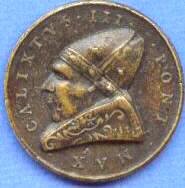 Alonso
Borgia was born in Xativa near Valencia of an old Catalan
family, January 13, 1378. A brilliant professor of canon law at
the University of Lerida, he was made canon by Antipope Benedict
XIII. After that obstinate Spaniard died, Alonso used his
influence to reconcile his shadow successor, Antipope Clement
VIII, to Pope Martin V. Martin made him bishop of Valencia, and
Alonso showed his loyalty by refusing the position of royal
Aragonese envoy to the schismatic Council of Basel. Eugene IV
thereupon made him cardinal and invited him to join the papal
curia, where he served with credit.
Alonso
Borgia was born in Xativa near Valencia of an old Catalan
family, January 13, 1378. A brilliant professor of canon law at
the University of Lerida, he was made canon by Antipope Benedict
XIII. After that obstinate Spaniard died, Alonso used his
influence to reconcile his shadow successor, Antipope Clement
VIII, to Pope Martin V. Martin made him bishop of Valencia, and
Alonso showed his loyalty by refusing the position of royal
Aragonese envoy to the schismatic Council of Basel. Eugene IV
thereupon made him cardinal and invited him to join the papal
curia, where he served with credit.
Alonso was a dark horse in the conclave which followed the
death of Nicholas V. Only after the cardinals failed to unite on
the outstanding Capranica or Bessarion, the learned and pious
Greek, did the votes swing in compromise to Alonso Borgia.
Alonso accepted and took the name Calixtus III.
Although seventy-seven years old, Calixtus still had abundant
energy. His great objective was to save Christendom from the
Turks. To this end he subordinated everything else. Humanists
and artists wailed for the good old times of Nicholas V. Money
still flowed, but to generals and munition makers rather than to
poets and artists. The careers of Calixtus III and of his
successor Pius II prove that if a large part of Eastern Europe
went under the Turkish domination the fault was not the popes.
The failure of Calixtus proves how far papal prestige had
already declined. Calixtus pleaded, urged, threatened the
monarchs of Europe--in vain.
Calixtus had one moment of triumph when that great Hungarian,
John Hunyadi, accompanied by St. John Capistrano, saved Belgrade
from the mighty grasp of Mohammed II. It was a great victory,
but unfortunately Hunyadi died shortly after it. He had no
successor, and even the glory of the Belgrade victory could not
infect the cold monarchs of Europe with crusading enthusiasm.
Absorbed as he was with the crusade idea, Calixtus still
found time for an act of justice. It was he who ordered the
posthumous re-examination of Joan of Arc's case which resulted
in the glorious vindication of that heroine.
A man of austere life, Calixtus was in many ways a good pope.
Unfortunately he had one defect, dangerous in a spiritual
leader. He was overfond of his family. Catalans flooded to Rome
to enjoy papal favor--much to the disgust of the Romans.
Calixtus created two of his nephews cardinals at an early age.
One of these, Rodrigo Lanzol-Borgia was later, as Pope Alexander
VI, to overshadow Calixtus by his reputation--a reputation that
was quite unsavory.
Calixtus III died still full of plans for the future on
August 6, 1458. His death was the signal for popular outbreaks
against the hated Catalans.
Excerpted from "Popes
Through the Ages" by Joseph Brusher, S.J.

